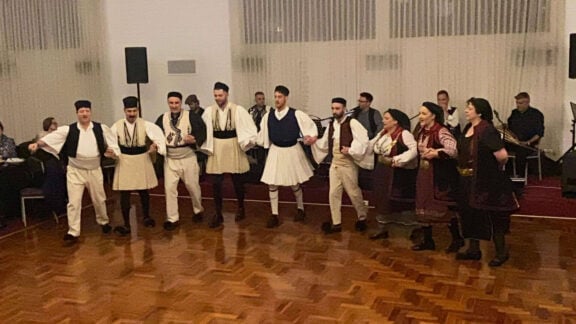The Eagle Has Two Faces: Journeys through Byzantine Europe is a recently released ‘travelogue’ by Alexander Billinis, exploring the remnants of the Byzantine Empire. Born in the US of Greek parents, it began as a quest to discover his Greek identity, and has led him to a conception of the deep relationship between Greece and the Balkan states.
“Growing up as a Diaspora Greek, I was constantly seeking what it means to be Greek,” he says in an interview with Neos Kosmos.
“To me, who we are as Greeks has far more to do with the thousand plus years of Byzantine history and the 500 years of Turkish rule than the Classical Greek period.” Centred around Constantinople, the Byzantine Empire lasted from the fourth century to the mid 1400s. Throughout its duration, it was perhaps the most politically, economically and culturally advanced society on earth. It finally succumbed to the Ottoman Empire in 1453. Subsequently, Byzantine achievements have drifted into obscurity.
“It is never talked about, and as a result it is easy to dismiss a whole culture, to the detriment of the Greeks, the Serbs and others who are successors to this civilization,” he continues. The Eagle Has Two Faces seeks to redress this anomaly, and rediscover a vital period of history which binds the cultures of Greece and the Balkans. Alexander contends that under the Ottomans, these two geographically European entities were insulated from western influence, and therefore share a common experience which has seen them emerge behind, and out of step with the rest of Europe.
Moreover, this legacy goes a long way to explaining the prevailing condition of the region, from the disintegration of the former Yugoslavia, to Greece’s current economic malaise, Alexander argues. Alexander was born in Salt Lake City, Utah, and says if anything, the concentration of Mormons there made the Greek community more cohesive. After studying international business and law, he carved out a successful career in banking. Consequently, much of the analysis in his book is based on business and economics.
“When I worked in Greece as a banker, it was astonishing how nearly all Greek investment is in ex-Byzantine countries,” he says. Having lived and worked in Bulgaria and Greece, and travelled widely throughout Turkey, Italy Austria and Hungary, his experience of the region is substantial. Now living in Serbia with his Serbian wife, the pattern continues. “Living in Serbia is not a foreign experience for a Greek, since so many of the symbols of identity are the same.” His search has clearly yielded results; historical, cultural and even personal. “The Byzantines are where we come from, so by studying them, by visiting their sites, and what remains of their culture, I learn about myself.”
The Eagle Has Two Faces: Journeys through Byzantine Europe can be purchased through www.amazon.co.uk









